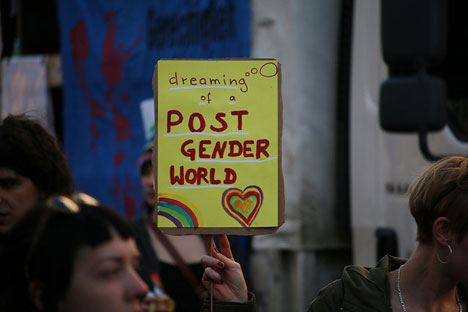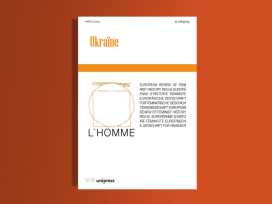In her recent Eurozine article, Slavenka Drakulic gives a grim overview of the situation in which women in post-communist Europe after 1989 have found themselves. Very few would disagree that being (and living) as a woman in Central Europe is no laughing matter. A glance at the statistical data and gender equality index for this region would suffice to confirm this view. Like all minorities – Roma, disabled people, migrants, elderly people or those living under the poverty line – women paid a serious price for the neoliberal transition of 1989. However, in this article, I argue that there are ways to change this grim situation, other than what Slavenka Drakulic calls “emancipation after emancipation”. My suggestion is that progressive actors should instead self-critically rethink the neoliberal emancipation model and try to re-enchant the doing of feminist politics in order to reach out to a wider public, instead of blaming others for being misunderstood (for more on which, see Peto 2015a: 125-32).

A demo in Berlin, 8 March 2014. Photo: Mike Herbst. Source: Flickr
This would be a timely task, as progressive, human rights-based secular women’s movements respond defensively towards the “anti-gender” movements that are gaining momentum day by day across both eastern Europe, including Hungary, Poland and Slovakia; and western Europe, including France and Germany. Drakulic blames the “Catholic Church” for this process, while ignoring the ongoing transformation of the Catholic Church. The Catholic Church has never been homogenous and is today trying to transform itself to meet the demands of the twenty-first century, through changing leadership structures and the inclusion of more women (Marschütz 2014). Be this as it may, the “anti-gender movement” should be taken seriously; at the same time, we should also break out of the vicious circle of “emancipation after emancipation” described by Drakulic, which even in the absence of blossoming “anti-gender movements” is, in the long run, the surest recipe for failure.
Why do anti-gender movements matter?
These anti-gender movements are opening up new territory in Europe’s political, cultural and social landscape, and challenging established political cleavages. Tens of thousands of people are demonstrating in the streets from Warsaw to Paris against same-sex marriage, collecting enough signatures for a referendum in Slovakia on controlling the rights of a group of citizens to marry and to adopt children, and petitioning for a change in the curriculum that would ban sexual education in Slovakia (Peto/Vasali 2014). On the one hand, the popular appeal of democratic politics is decreasing: less and less voters participate in elections and traditional parties have problems recruiting young members. On the other, the number of women participating in secular, human rights-based women’s organizations remains the same. So this new anti-gender movement seemingly solves associated problems of participation.
The result is a new rhetoric of identity formation, outside the received framework of universal human rights in which gender had found a comfortable space for itself. However it is only upon first sight that these new movements appear to be anti-gender, because they attack what they call “gender ideology”. But as careful analysis of five countries shows (Hungary, France, Germany, Poland and Slovakia – see Kovats and Poim, Gender as Symbolic Glue, 2015), these movements’ argumentation offers a broad alternative to established ways of thinking: gender is only the symbolic glue. It remains an open question as to how progressive politics is to gauge this new political, electoral, social and cultural trend, and how this trend will influence traditional conservative politics, itself a product of the European consensus on human rights.
The representatives of anti-gender movements may seem to be arguing purely about issues of gender policy but actually wish to foster profound change in European political and value systems. Slavenka Drakulic recognized in her article the signs of this change. But such change is only possible now that the promise of gender equality has been broken (in the case of “new Europe”); or has led to too many premature and superficial changes (in the case of “old Europe”).
Moreover, the anti-gender movement is a global phenomenon. Its global appeal draws on the fact that various countries increasingly question the universal human rights framework of politics, including on the grounds of “cultural” exceptionalism. In several cases, governments in Africa have criticized aid programmes that include the promotion of reproductive rights for imposing a “gender ideology” and that, according to the same governments, must be countered in the national context in the spirit of an anti-colonialist “fight for freedom”. The popularity of these anti-gender movements means that if progressive politicians wish to understand this major new political trend, they can only succeed in doing so through the use of a new conceptual framework. These anti-gender movements are not at all utopian, they do not seek to accomplish gender equality in the near future. They do not demand “emancipation after emancipation”, but rather focus on the political temporality of Now. In short, these movements are built on the fundamental weaknesses of a progressive politics that promises to effect swift changes in a globalized world.
Reactions
Slavenka Drakulic is not alone in being unfamiliar with the growing body of literature that analyses “anti-gender” movements. Both the phenomenon and scholarly and political reflection about it, as well as associated counter-strategies, are very recent. The first entry in the chronology that Kovats and Poim present in their Gender as Symbolic Glue volume concerns the 2006 publication in the German conservative newspaper FAZ of an early article opposing what the author Volker Zastrow calls “gender”. In events thereafter, the line between conservative and far-right forces quickly becomes blurred. Progressive political actors are just starting (meaning, during the course of the last two (!) years) to recognize that they are being pushed into a corner, from the standpoint of which, they should only act after careful thought (Heinrich Böll Foundation, 2015). It is a political imperative to recognize that anti-gender mobilization is a hegemonic fight, in the Gramscian sense, for control. For this is what is redefining human rights, and the progressive European tradition of equality.
The first reactions to anti-gender movements tended to be enlightened and offended, questioning the ability of the other to understand what gender is. Gender activists then commenced the first educational campaigns.
The second reaction was of a defensive nature and sought to use the language of gender equality policy to reinforce the fortress of already existing policy provisions. Elzbieta Korolczuk pointed out that those scholars using the term “backlash” when characterizing the anti-gender movement erroneously assumed there to be a broad consensus about what gender means and what it should achieve (Korolczuk 2014). Korolczuk’s argument reinforces the view that statements made by Drakulic only scratch the surface, as far as the impact of neoliberal emancipation is concerned.
The third reaction, parallel to entrenchment, involves blogging and using new social media to monitor developments inside anti-gender movements. This went hand-in-hand with remaining vigilant as regards problems in the Catholic Church, which is believed to be the major initiator and institutional organizer of anti-gender campaigns (Paternotte 2014). It is this reaction that Drakulic describes in her article.
Counter strategies
The main battleground for “gender ideology” turned out to be science. New “scientific data” is emerging on such topics as the emotional stability of children brought up by same-sex parents, to mention just one. As Roman Kuhar convincingly argued in his comparison of developments in Slovenia and Croatia: the anti-gender movement’s use of “scientific” evidence against “gender ideology” means a paradigm change in science as we know it. Any scientific data becomes contested, based on normative moral positions. Kuhar called this strategy the “secularization of the discourse in order to clericalize society” (Kuhar 2014). The post-modern turn, which introduced a politically informed, critical and interdisciplinary way of studying science, pointed to the construction of new knowledge, such that unacknowledged actors needed to be acknowledged from a critical perspective – with gender being one of these critical perspectives. In this context, science became a moral and normative category, such that the positionality of the knower became acknowledged. This approach also questioned the subject-object division and prompted the emergence of new symbols as well as new myths and redefinitions. This positionality – which Eric Hobsbawn referred to thus: “my truth is as valid as your truth” – signals an anti-universalistic approach leading to a new scientific paradigm that has since been appropriated by anti-gender forces. However, the visibility of anti-gender forces and of “naming and shaming” strategies only achieved partial success in the debate concerning what is scientific according to whom. This in turn only amounted to a deepening of cleavages, without yielding any real understanding of the depths of the threat to the infrastructure of human rights and especially without offering new methods or rhetoric in support of progressive politics as regards both what has been achieved and how to move forward.
The first step for formulating counter strategies is to create an independent strategy, not only reacting to the attack. It should be accepted that progressive politics is a result of the Enlightenment and therefore implies a clear-cut vision of normativity that always creates minorities, that always engages in “othering”. The European tradition of Enlightenment is working with normative positions, as Slavenka Drakulic knows – whether “women in post-communist Europe” (en bloc) laughed or not. Therefore, this anti-gender campaign is just appropriating the old tools in order to mount a unified attack on LGBTQ groups with a view to strengthening European Christian cohesion. Magdalena Sroda, the Polish feminist philosopher said that this fight against “gender ideology” is an “alliance between church and the stadium”. This statement implies that this anti-gender movement is only a renewed form of neoliberalist governability based on consumption and mass control. But it is not only that. This is a fight for redefining neoliberal representative democracy, and this process is creating new political cleavages; in view of which, progressive politics needs to have its wits about it.
By now, it should be clear that the anti-gender movement is a new phenomenon in European politics that thrives on the failures of the neoliberal emancipation project. Therefore, new methods and frameworks of thinking are required if progressive forces are to be able to offer meaningful responses. If progressive politics forgets its invaluable and innovative grass-root origins, it will have to fall back on run-of-the-mill gender equality policy measures that cannot prevent this new anti-genderism from prevailing in the long run. As a result, the demand for “emancipation after emancipation” will follow. The bravery and the originality of those historical political actors who dared to question what were previously perceived as the unquestionable dogmas of social and political life should be applied. “Disenchanted” progressive politics should be “re-enchanted” (Peto 2015: 139-45). The most successful mobilizational force of these anti-gender movements is the new language that they are using for political mobilization. Using the concept of gender as a technical category can, in the long run, be more self-destructive than useful in the encounter with this new political challenge. The real new challenge is that never after 1945 have anti-modernist alternatives received so many votes in democratic elections, as viable alternatives. The rise of far-right politics is a fact and, in their electoral success, anti-genderism works as a symbolic glue. No more time should be wasted by progressive forces on thinking of alternatives. The article by Drakulic is the first step in that direction, but progressive actors should not stop here.
References:
Heinrich Böll Foundation, Anti-Gender Mobilization on the Rise? Strategizing for Gender Equality in Central and Eastern Europe, Böll Foundation, 2015, cz.boell.org/sites/default/files/2015-04-anti-gender-movements-on-the-rise.pdf
Elzbieta Korolczuk, “‘The War on Gender’ from a transnational perspective: Lessons for a feminist strategizing”, Heinrich-Böll-Stiftung, 2014, pl.boell.org/sites/default/files/uploads/2014/10/war_on_gender_korolczuk.pdf
Eszte Kovats and Maari Poim (eds.) (2015), Gender as Symbolic Glue, FEPS, 2015, library.fes.de/pdf-files/bueros/budapest/11382.pdf
Roman Kuhar, “Playing with science: Sexual citizenship and the Roman Catholic Church counter-narratives in Slovenia and Croatia”, Women’s Studies International Forum 49 (2014).
Gerhard Marschütz, “Trojanisches Pferd Gender? Theologische Anmerkungen zur jüngeren Genderdebatte im katholischen Bereich”, in: K. Schlögel and G.M. Prüller-Jagenteufel, (eds.), Aus Liebe zu Gott – im Dienst an den Menschen: Spirituelle, pastorale und ökumenische Dimensionen der Moraltheologie, LIT Verlag, 2014, 433-56.
David Paternotte (2014), Christian Trouble: The Catholic Church and the Subversion of Gender, 2014. In: councilforeuropeanstudies.org/critcom/christian-trouble-the-catholic-church-and-the-subversion-of-gender/
Andrea Peto (2015a), “‘Anti-gender’ mobilizational discourse of conservative and far right parties as a challenge for progressive politics”, in: Gender as Symbolic Glue: The Position and Role of Conservative and Far Right Parties in the Anti-Gender-Mobilization, Eszte Kovats and Maari Poim (eds.), Gender as Symbolic Glue, FEPS, 126-32, library.fes.de/pdf-files/bueros/budapest/11382.pdf
Andrea Peto (2015b), “Gender equality as re-enchantment: Political mobilization times of ‘neo-patriarchal neoliberalism’ and possibilities of bipartisan dialogue”, in: Maari Poim and Judit Tánczos, Woman Up! 2″: A Transatlantic Dialogue, Foundation for European Progressive Studies. 2015, 139-45, www.feps-europe.eu/en/publications/details/298″
Andrea Peto, Zoltán Vasali (2014), “The ‘laboratory’ called Hungary: A challenge for understanding protest movements”, openDemocracy, 20 January 2014, www.opendemocracy.net/can-europe-make-it/andrea-pet%C5%91-zolt%C3%A1n-vasali/%E2%80%98laboratory%E2%80%99-called-hungary-challenge-for-understanding
Volker Zastrow (2006), “Politische Geschlechtsumwandlung”, FAZ, 20 June 2006, www.faz.net/aktuell/politik/gender-mainstreaming-politische-geschlechtsumwandlung-1327841.html







